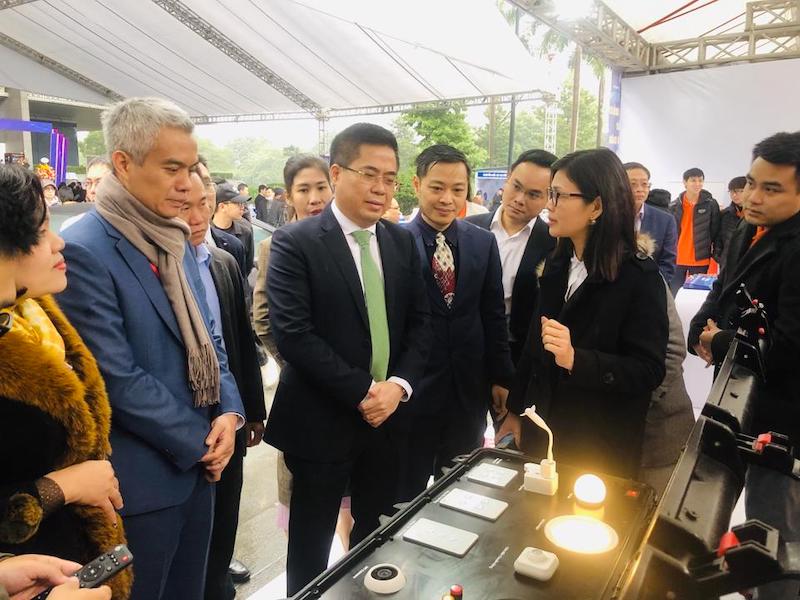Efforts to attract investment capital into Vietnamese startups
A number of supportive policies over the past years have enabled Vietnam to create room for domestic startups to grow, especially in areas where Vietnam is on par with other countries.
Vietnam has the potential to become a hub in Southeast Asia for startups thanks to its policies and the quality of its human resources, according to HSBC.
The country's rapid progress in new fields, such as Metaverse and Blockchain, has helped Vietnamese startups attract investors, it said.
Potential fields
| Airlios launches its product at the Vietnam Motor Show 2022. Photo: Airlios |
HSBC said Vietnam is emerging as a Southeast Asian hub for startups, behind Indonesia and Singapore. Meanwhile, ADB believed that the next unicorn in the Asia Pacific could be Vietnam.
Capital invested in Vietnamese tech startups has increased in the past three years. In 2022, a record US$2 billion is estimated to be poured into Vietnamese startups, with completed deals, such as Sky Mavis with $150 million, OnPoint ($50 million), and Timo ($20 million). In 2021, investment in Vietnamese startups reached $1.3 billion, four times compared to 2020.
Local experts said in the coming times, tech startups around the world will focus on digital transformation (AI, 5G, IoT...), automation technology (Big Data, 3D printing) and healthcare technology of which Vietnam has many advantages.
In 2021, investment capital in digital transformation and healthcare increased by 205% and more than 1,000%, respectively on a year-on-year basis. Financial technology and e-commerce are the areas in which the most investment capital has been injected into startups.
Specifically, in late October last year, Vietnamese startup Airlios attracted the attention of investors and visitors at the Vietnam Motor Show 2022 by showcasing its flying electric car model. The vehicle looks promising in the fields of tourism, freight and passenger transportation and rescue. It is the first Southeast Asian startup operating in the electric flying car market.
According to Fortune Business Insights, the global electric flying car market is projected to grow from US$255.3 million in 2022 to $1.5 billion in 2040, at a compound annual growth rate (CAGR) of 58.1% during the forecast period. There are still a lot of scopes for Vietnamese startups to seize opportunities, especially in areas where Vietnam is on par or not far behind other countries, such as security, blockchain, artificial intelligence (AI), and the Metaverse.
The success of Sky Mavis' Axie Infinity game based on blockchain technology is also typical of seizing new opportunities. The app has helped Axie Infinity earn hundreds of millions of dollars of investment with a market capitalization of up to $8.5 billion. Axie Infinity remains one of the most successful blockchain products worldwide.
Supportive policies
| Delegates attend Hanoi's Digital Transformation and Innovation Exhibition 2022. Photo: The Hanoi Times |
The reason why Vietnamese technology startups attracted a large capital is that the country is converging many favorable conditions to form an international startup hub.
A young population, extensive Internet coverage, high smartphone penetration, and strong government policies to support start-ups and technology businesses are Vietnam's main advantages in the eyes of international investors.
For many years, the government has continued making innovative policies to facilitate business start-ups, according to local businesses. Specifically, the government's “Supporting students and students to start a business by 2025” project dated 2017 is considered an important milestone to create a dynamic startup environment. In addition, Politburo’s Resolution 52 on the Fourth Industrial Revolution defined the role of entrepreneurship and innovation and developing appropriate management mechanisms.
According to the 10-year socio-economic development strategy for 2021-2030, key tasks for the rapid and sustainable development of the country have also been set out, which will be mainly based on science, technology, innovation, and entrepreneurship.
The government has also concretized the support for the startup community by establishing dozens of institutions such as the National Technology Innovation Fund (NATIF), the National Agency for Technology Entrepreneurship and Commercialization Development (NATECD), the National Startup Support Center (NSSC) under the Ministry of Science and Technology, the Vietnam National Innovation Center under the Ministry of Planning and Investment, and the National Association of Entrepreneurship (NIC).
Besides, the active operations of a series of programs over the past two years have been helpful: Vietnam Venture Summit, Techfest, Startup Wheel, Vietnam Startup Day, Vietnam Innovation Summit, Startup Kite, and others.
Currently, local universities and research institutes have been coordinating with provincial governments and central ministries to set up startup support institutions for young people after graduation.
In addition, it is worth mentioning the presence of investment funds targeting Vietnamese startups, numbering more than 100 in the country and abroad. These are Vingroup Ventures (Vingroup Group) with an investment capital of VND2 trillion, and FPT Ventures Fund (FPT Corporation) focusing on funding startup projects with a valuation of less than $1 million.
Recently, the Ministry of Science and Technology and Intracom Group, a multi-sector investment company, launched a public-private partnership model to develop the national startup and innovation complex. This will be a place to focus on training, incubate innovative startup projects, and promote national and international investment connections. Besides, the complex will implement joint projects and others on researching, transferring, piloting foreign innovation and startup models in Vietnam.
Speaking of opportunities for Vietnamese startups, Dang Khanh Hung, Research Director of FPT Blockchain Lab, assessed that it is not uncommon for Vietnam to often lag behind the world in terms of technology, but in new areas such as Metaverse and Blockchain, the story is completely different. Many Vietnamese blockchain projects, such as Axie Infinity, the NFT [Non-Fungible Tokens] game, attracted up to several tens of millions of dollars from international investment funds. As Vietnam had a similar starting point as other countries, the opportunities for startups in these fields are the same.
However new companies entering new fields will face many challenges. "As a pioneer, you will learn from your own lessons in building your business model, without any guidance", Hung said, adding that it takes time, patience, and determination to create a good startup with a large number of users, but it is worth it because that is the right direction.











